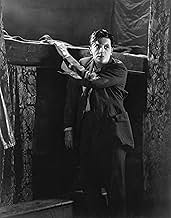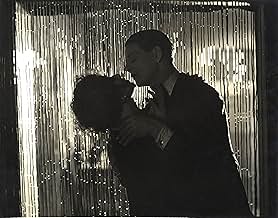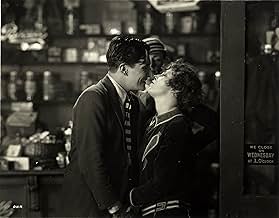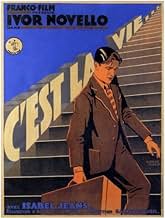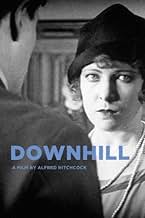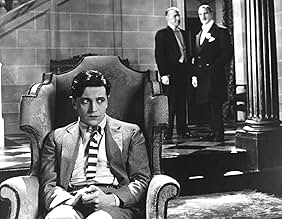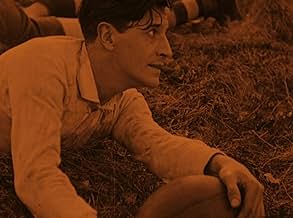IMDb-BEWERTUNG
6,0/10
3322
IHRE BEWERTUNG
Füge eine Handlung in deiner Sprache hinzuBound by honor, a successful schoolboy takes the blame for his roommate's indiscretion, and it's all downhill from there.Bound by honor, a successful schoolboy takes the blame for his roommate's indiscretion, and it's all downhill from there.Bound by honor, a successful schoolboy takes the blame for his roommate's indiscretion, and it's all downhill from there.
Constance Collier
- Dance Hall Lady with Purse
- (Nicht genannt)
Daisy Jackson
- The Seductive Waitress
- (Nicht genannt)
Empfohlene Bewertungen
Classmates and close friends at an English public school, Roddy Berwick and Tim Wakely compete for the affections of a local shop girl. When the girl falsely accuses Roddy of getting her pregnant, he is expelled. However, Roddy remains silent to protect Tim, who was the guilty party, and the friends make a pact to keep silent. Outraged at his expulsion, Roddy's father does not believe his son's claims of innocence and throws him out. Thus, Roddy strikes out on his own, and his life begins a downward spiral from stage acting to a disastrous marriage to taxi dancing to the Marseilles waterfront. "When Boys Leave," also known as "Downhill," was Alfred Hitchcock's fifth completed film, and, early on in his career, the master director explores his oft-repeated theme of the wrongfully accused.
Shot in 1927, the film is silent with inter-titles, and the black-and-white cinematography is often well lit with striking visual compositions. However, Hitchcock generally holds the camera steady, and movement occurs within the frame. The film lacks the camera fluidity common among movies of the late silent era, although Hitchcock is already a master of visual story-telling, and the inter-titles are brief and sparse. As Roddy's life reels out of control, he is dwarfed by his surroundings in rooms with impossibly high ceilings and doors that are more than twice his height. Fortunately, Hitchcock elicits naturalistic performances from his cast, and none indulges in the grand style of acting that negatively stereotyped silent movies. Ivor Novello, a Welsh matinée idol best known for his musical talents, plays the suffering Roddy quite well. Isabel Jeans as Julia Fotheringale, a spendthrift actress, and Ian Hunter as Archie, Julia's shady lover, provide amusing support during one colorful episode in Roddy's descent.
"When Boys Leave" is from Hitchcock's apprentice period in England, when he was still learning the craft. While the story is thin, and the motivations vague, this short silent film shows flashes of the genius to come, and, for students of the master, every Hitchcock film is worthwhile viewing.
Shot in 1927, the film is silent with inter-titles, and the black-and-white cinematography is often well lit with striking visual compositions. However, Hitchcock generally holds the camera steady, and movement occurs within the frame. The film lacks the camera fluidity common among movies of the late silent era, although Hitchcock is already a master of visual story-telling, and the inter-titles are brief and sparse. As Roddy's life reels out of control, he is dwarfed by his surroundings in rooms with impossibly high ceilings and doors that are more than twice his height. Fortunately, Hitchcock elicits naturalistic performances from his cast, and none indulges in the grand style of acting that negatively stereotyped silent movies. Ivor Novello, a Welsh matinée idol best known for his musical talents, plays the suffering Roddy quite well. Isabel Jeans as Julia Fotheringale, a spendthrift actress, and Ian Hunter as Archie, Julia's shady lover, provide amusing support during one colorful episode in Roddy's descent.
"When Boys Leave" is from Hitchcock's apprentice period in England, when he was still learning the craft. While the story is thin, and the motivations vague, this short silent film shows flashes of the genius to come, and, for students of the master, every Hitchcock film is worthwhile viewing.
I just watched this film which I purchased on Ebay. I am a fan of Ivor Novello primarily because of his operatic musicals of the thirties and forties. I saw The Lodger recently and was impressed with his performance, read a biography or two, enjoyed Jeremy Northam's portrayal in Gosford Park, and am hunting for other performances in the cinema. This movie is very well done and adds an interesting insight into Hitchcock's early career. The quality of the acting, photography, use of symbolism are undeniable. I thought the impression that women are a bit dangerous was a major point but at least his mother cared about him although she didn't seem to resist his father's impulsive banishment. This is a film which held my interest throughout and I highly recommend it.
A slapdash early effort by young director Alfred Hitchcock, "Downhill" a. k. a. "When Boys Leave Home," delivers moments of brilliance undone by an underbaked plot.
Young Roddy (Ivor Novello) is expelled from his boarding school when he is charged with a major infraction involving a woman at a local bake shop. No use appealing to his father, who stares at him with frightening disgust. Roddy makes his way alone in life, coming up against a pair of theatrical con artists before landing in a seedy music hall, providing dances for lonely women at 50 francs a whirl. It all gets to be too much for the frail boy.
Poor Roddy can't catch a break, even in cyberspace. A lot of reviewers, both here at IMDb.com and elsewhere, have at the fellow for one deathless line he delivers when his headmaster drops the hammer: "Can I - Won't I be able to play for the Old Boys, sir?" It's a line dripping with ingenuousness, but actually works better in context. Roddy is a true believer in the code of his school who runs up against a world that doesn't allow for second chances.
Based on an adaptation of a play Novello co-authored with Constance Collier under the pseudonym "David L'Estrange," "Downhill" pushes the action from one setpiece to another with little explanation or character development. Hitchcock seems far more enthusiastic about his set pieces and camera tricks than giving the viewer anything to hold onto. Even dialogue cards are kept at a minimum in this very non-verbal silent film.
The best sequence, a section called "The World Of Make-Believe," plunges Roddy into the harsh world of show biz, where conniving actress Julia (Isabel Jeans) and her significant other Archie (Ian Hunter) set up a suddenly cash-rich Roddy.
Watching Archie as Roddy pledges his love to Julia, smoking and drinking and looking frightfully bored as he awaits the chance to offer his casual blessing to their ersatz union, features terrific acting from all concerned. Hitchcock does well in this section by playing up the humor of the situation. But when it's over, there's no explanation or attempt at grounding things. What's this kid going to do about his new marriage? We just follow Roddy to his next stop on his downhill journey.
Hitchcock presents us with some arresting images. One favorite of mine shows a daytime view of Roddy's boarding school dissolving into a scene of London at night. Anyone curious at how England looked in the 1920s will enjoy these views for their travelogue value, anyway.
Novello is worthy, too, carrying the film as he must. He's too old for the part, but believably earnest even as he goes from bright student to all-around chump. A better film would give us more of a basis for this, but all we get is some eye fluttering from Novello to tell us of his deer-in-the-headlights state. It worked for Novello's female fan base at the time, but not for us.
Hitchcock too often works in this surface manner. He shrugs off any subtlety in pursuit of the big effect. The worst of these feature Roddy's father, Sir Thomas (Norman McKinnel), who bears a striking resemblance to Nosferatu and shows up late in the film in Roddy's wracked point-of-view in a slew of implausible guises.
Still, I was interested enough in Roddy's journey, if only as a matter of historical interest. Early on, we see he is the genuine article, a real believer in the world he inhabits, holding a cap emblazoned with the word "Honour." There's a scene, arrestingly similar to the deconstructive Lindsay Anderson film "if ", where Roddy and his friend meet that girl in the bake shop. No playing tiger in this one, Roddy just dances with the girl a little and tries to make a polite exit, but the damage is just as much as if he broke out the tommy guns like Mick and company in that later, anarchic classic.
"Downhill" is a coming-of-age movie that only really works as a look at Hitchcock's own coming of age – before he arrived.
Young Roddy (Ivor Novello) is expelled from his boarding school when he is charged with a major infraction involving a woman at a local bake shop. No use appealing to his father, who stares at him with frightening disgust. Roddy makes his way alone in life, coming up against a pair of theatrical con artists before landing in a seedy music hall, providing dances for lonely women at 50 francs a whirl. It all gets to be too much for the frail boy.
Poor Roddy can't catch a break, even in cyberspace. A lot of reviewers, both here at IMDb.com and elsewhere, have at the fellow for one deathless line he delivers when his headmaster drops the hammer: "Can I - Won't I be able to play for the Old Boys, sir?" It's a line dripping with ingenuousness, but actually works better in context. Roddy is a true believer in the code of his school who runs up against a world that doesn't allow for second chances.
Based on an adaptation of a play Novello co-authored with Constance Collier under the pseudonym "David L'Estrange," "Downhill" pushes the action from one setpiece to another with little explanation or character development. Hitchcock seems far more enthusiastic about his set pieces and camera tricks than giving the viewer anything to hold onto. Even dialogue cards are kept at a minimum in this very non-verbal silent film.
The best sequence, a section called "The World Of Make-Believe," plunges Roddy into the harsh world of show biz, where conniving actress Julia (Isabel Jeans) and her significant other Archie (Ian Hunter) set up a suddenly cash-rich Roddy.
Watching Archie as Roddy pledges his love to Julia, smoking and drinking and looking frightfully bored as he awaits the chance to offer his casual blessing to their ersatz union, features terrific acting from all concerned. Hitchcock does well in this section by playing up the humor of the situation. But when it's over, there's no explanation or attempt at grounding things. What's this kid going to do about his new marriage? We just follow Roddy to his next stop on his downhill journey.
Hitchcock presents us with some arresting images. One favorite of mine shows a daytime view of Roddy's boarding school dissolving into a scene of London at night. Anyone curious at how England looked in the 1920s will enjoy these views for their travelogue value, anyway.
Novello is worthy, too, carrying the film as he must. He's too old for the part, but believably earnest even as he goes from bright student to all-around chump. A better film would give us more of a basis for this, but all we get is some eye fluttering from Novello to tell us of his deer-in-the-headlights state. It worked for Novello's female fan base at the time, but not for us.
Hitchcock too often works in this surface manner. He shrugs off any subtlety in pursuit of the big effect. The worst of these feature Roddy's father, Sir Thomas (Norman McKinnel), who bears a striking resemblance to Nosferatu and shows up late in the film in Roddy's wracked point-of-view in a slew of implausible guises.
Still, I was interested enough in Roddy's journey, if only as a matter of historical interest. Early on, we see he is the genuine article, a real believer in the world he inhabits, holding a cap emblazoned with the word "Honour." There's a scene, arrestingly similar to the deconstructive Lindsay Anderson film "if ", where Roddy and his friend meet that girl in the bake shop. No playing tiger in this one, Roddy just dances with the girl a little and tries to make a polite exit, but the damage is just as much as if he broke out the tommy guns like Mick and company in that later, anarchic classic.
"Downhill" is a coming-of-age movie that only really works as a look at Hitchcock's own coming of age – before he arrived.
.. based on a play by star Ivor Novello. He plays Roddy Berwick, the big man on campus at a prestigious private school. He enjoys rugby and spending time with his best chum Tim Wakely (Robin Irvine). Tim has a dalliance with a girl of "low morals", and when she becomes pregnant, she spitefully blames Roddy, who out of loyalty to his buddy Tim accepts the blame is expelled from school. This sets him on a path "downhill" away from his promising future, towards a wretched existence as a bit actor and male prostitute.
This is rather corny and overlong, although those interested in Novello, a huge star of stage and screen in the UK in first half of the 20th century, will most likely get more out of it. Hitchcock shows off a few camera tricks and artistic shots, like a lingering scene of Novello descending an escalator into the Underground rail as a symbol of his societal descent. I also thought it rare to see a male prostitute in a film of this era, even though female pros seem to figure into every other silent film.
This is rather corny and overlong, although those interested in Novello, a huge star of stage and screen in the UK in first half of the 20th century, will most likely get more out of it. Hitchcock shows off a few camera tricks and artistic shots, like a lingering scene of Novello descending an escalator into the Underground rail as a symbol of his societal descent. I also thought it rare to see a male prostitute in a film of this era, even though female pros seem to figure into every other silent film.
My copy of this movie is truly silence with no musical score. Whenever I watch a movie that is completely silent, initially I find it a little hard. But when the film is well made, as this one is, it doesn't take long to adjust and focus on the story as you are drawn into it. I feel Hitchcock was a master of the silent film genre with his ability to tell such a deep story with very few intertitles. Relying instead on the expressions of the actors and written notes and signs in the movie, without having to cut away to an intertitle, which allows the film to flow more fluidly instead of constant cutting between the live action and the title cards. Ivor Novello in the lead role of Roddy and in his prior work with Hitchcock in The Lodger really impressed me with his talent of conveying his feelings strictly through facial expressions and acting without the use of sound. Hitch is also good at using subtle exaggeration and focus on action to help take the place of the sound in his silent films.
The story is that of a young man in school who is falsely accused of theft by a lady that he had danced with and he is willing to take the blame for a friend of his and is expelled from school. This leads to the downhill spiral of his life as leaves home after his father calls him a "LIAR!". Things get worse from there as ends up working as a gigolo in Paris, getting in fights, losing a large sum of money, and eventually hitting bottom.
In this film we really begin seeing a lot of Hitchcock's visual style that he is so famous for. He has some really good use of fades and graphic matches between scenes. Two of my favorite where the fading out on the pocket watch and into a large clock, and the other being the scene where he fades out on a photograph and then back in on the real person. I really enjoyed the symbolic shot of Roddy heading down the escalator, showing us that is in heading downhill in his life. And my favorite "Hitch" shot in this movie was the point-of-view shot when the lady was leaning back in her chair and it cuts to Roddy walking into the room and we see him upside down on the screen. I also thought Hitchcock did a great job of portraying Roddy's seasickness towards the end of the film. I really enjoy seeing Hitchcock's style developing in his early silent films, that will become so prominent in his later, more famous movies. I also really appreciate Hitch's working in comedic scenes into his serious movies. My favorite humorous scene in this movie is the peashooter scene early in the film.
Without giving too much away, I would have liked to see a more typical Hitchcock ending to this film.
*** (out of 4 stars)
The story is that of a young man in school who is falsely accused of theft by a lady that he had danced with and he is willing to take the blame for a friend of his and is expelled from school. This leads to the downhill spiral of his life as leaves home after his father calls him a "LIAR!". Things get worse from there as ends up working as a gigolo in Paris, getting in fights, losing a large sum of money, and eventually hitting bottom.
In this film we really begin seeing a lot of Hitchcock's visual style that he is so famous for. He has some really good use of fades and graphic matches between scenes. Two of my favorite where the fading out on the pocket watch and into a large clock, and the other being the scene where he fades out on a photograph and then back in on the real person. I really enjoyed the symbolic shot of Roddy heading down the escalator, showing us that is in heading downhill in his life. And my favorite "Hitch" shot in this movie was the point-of-view shot when the lady was leaning back in her chair and it cuts to Roddy walking into the room and we see him upside down on the screen. I also thought Hitchcock did a great job of portraying Roddy's seasickness towards the end of the film. I really enjoy seeing Hitchcock's style developing in his early silent films, that will become so prominent in his later, more famous movies. I also really appreciate Hitch's working in comedic scenes into his serious movies. My favorite humorous scene in this movie is the peashooter scene early in the film.
Without giving too much away, I would have liked to see a more typical Hitchcock ending to this film.
*** (out of 4 stars)
Wusstest du schon
- WissenswertesThe £30,000 Roddy inherits would have equated to about $143,000 at the time (in 1927), and that amount equals over $2.5M in 2023.
- PatzerWhen Roddy and the girl are dancing in the candy shop, a gramophone record of a tune called "I Want Money" is shown. It's on the old "WINNER" label. In a flashback, it's playing again on the record player, but in a further flashback, in a montage, the record has become a "His Master's Voice" disc.
- Zitate
[first title card]
Title Card: Here is a tale of two school-boys who made a pact of loyalty. One of them kept it - at a price.
- VerbindungenFeatured in Shepperton Babylon (2005)
- SoundtracksI Want Some Money
Words by Herbert Rule & Fred Holt.
Music by L. Silberman.
Played on the gramophone machine by Mabel; even though Downhill is a silent film, the accompanying music would have referenced this song as it underscores elements of the plot.
Top-Auswahl
Melde dich zum Bewerten an und greife auf die Watchlist für personalisierte Empfehlungen zu.
Details
- Erscheinungsdatum
- Herkunftsland
- Sprache
- Auch bekannt als
- Downhill
- Drehorte
- Produktionsfirma
- Weitere beteiligte Unternehmen bei IMDbPro anzeigen
Box Office
- Weltweiter Bruttoertrag
- 158 $
- Laufzeit1 Stunde 20 Minuten
- Farbe
- Sound-Mix
- Seitenverhältnis
- 1.33 : 1
Zu dieser Seite beitragen
Bearbeitung vorschlagen oder fehlenden Inhalt hinzufügen


